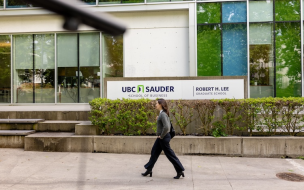MBA students with a desire to expand their horizons have an abundance of programs to choose from.
Here, BusinessBecause takes a look at five of the best US MBA programs for international trips and consuting projects:
1. Stanford Graduate School of Business (GSB)
One major reason Stanford's curriculum stands out from the pack of elite MBAs is the requirement that all Stanford GSB students are required to participate in Stanford’s Global Experiences program—the school aims to get students involved with global management issues.
They ‘experience life changing insights’ and ‘understand the culture, business environment, and social norms’ of an unfamiliar country. Since the program began in 2009, over 3,500 students have participated in 90 countries.
“In requiring a global experience as part of the curriculum, Stanford GSB enables students to experience other cultures through in-country seminars with faculty, student-led study trips, four-week immersion projects and other individual opportunities,” says Katherine Robinson, director of the Global Experience program.
“These experiences build on the Stanford GSB mission to develop global leaders not just for business, but also for social purpose, so they are prepared to tackle significant global challenges."
Students have carried out projects on topics ranging from consumer behavior in South Korea, to economic mobility in Brazil.
2. University of California Berkeley, Haas School of Business
Berkeley-Haas' International Business Development Program (IBD) is the connective tissue between Berkeley’s international clients and MBA students who train to solve global consulting needs.
One-third of MBA students participate in the program’s ‘value-enhancing consulting projects,’ which offer a rare opportunity to work with partners in Kenya, India, and Brazil. Students receive hands-on experience with both companies and non-profits, implementing advanced strategies when addressing each client’s challenges.
According to Pam Joyce, interim executive director of the Institute for Business and Social Impact at Berkeley Haas, one of the main draws of IBD is its Global Social Venture competition—launched in 1999 and now one of the world’s leading contests for advances in social impact innovation.
“The competition supports the creation of businesses that bring about positive social change via sustainable practices in health, education, energy and the environment, with a special focus on emerging markets,” Pam explains.
3. Harvard Business School
The Global Initiative program at Harvard Business School is one of the most engaging programs on our list. This program is also a degree requirement, and students can get started right away.
First-year MBA students participate in FIELD (Field Immersion Experience for Leadership Development), which places students in small groups across 17 countries around the world to aid Harvard’s Global Partner organizations. This ‘action-oriented’ course is aimed at immersing students in an emerging market.
Second-year MBA students have the option to participate in the Immersive Field Course elective, which allows students to address important business and management problems in the same marketplaces.
For those familiar with Harvard’s Case Method approach (placing students in simulation exercises that mirror real-life business challenges), the field method used in the Global Initiative program doesn’t fall too far from the tree; it also hopes to drive home the importance of giving students the power to be decision makers inside and outside of the classroom.
4. University of Michigan, Ross School of Business
Ross School of Business students who opt to participate in the MBA Global Exchange program can take a full or half-semester to study at a school of their choice. Ross’ program stands out for its long list of global partner schools located all around the world, from Shanghai, to Buenos Aires, and beyond.
Students are encouraged to spend time considering which city will ‘best fit their academic and professional goals,’ and are restricted from participating until the second year of their program.
This program model is closely aligned with principles of cultural exchange. The course is listed as Pass/Fail, which allows students to have a break from the pressures of academic competition in order to fully immerse themselves in the experience of a new culture and network of students.
5. University of Pennsylvania, The Wharton School & INSEAD
The INSEAD-Wharton alliance has a diverse range of offerings, from a research center to tailored modules, to an applauded exchange program.
INSEAD, a graduate business school with several satellite campuses, is an acronym that stands for ‘European Institute of Business Administration’ (English). Together, the two schools hope to ‘nurture world-class research, enhance the globalization of our curricula, and experiment with global teaching innovations.’
The exchange program takes students across three continents to collaborate with international partners in joint research and more.
RECAPTHA :
4c
1e
3c
d6












